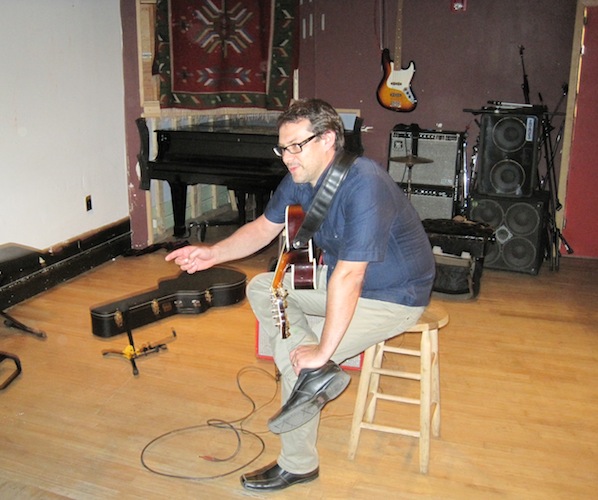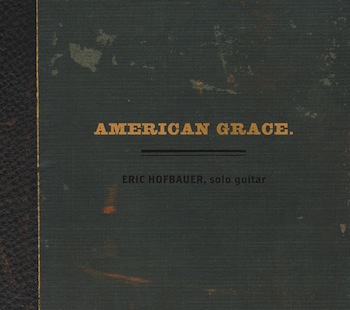Jazz Review: Guitarist Eric Hofbauer at the Lily Pad — A Mosaic of American Moods
Jazz guitarist Eric Hofbauer likes to deconstruct tunes and scramble them with free-associative juxtaposition.
Eric Hofbauer at the Lily Pad, Cambridge, MA, September 18.
By Jon Garelick
Eric Hofbauer doesn’t play his big hollow-bodied Guild guitar very loud — at least not by today’s standards — but few people get more sheer guitar sound out of their instruments. In fact, as technique and technology has advanced over the years, it’s possible to hear a jazz guitar that offers no evidence of plectrum hitting string — that beautiful liquid sound seems to materialize from the aether.
Not so with Hofbauer. At the Lily Pad he exploited every element of dynamics and timbre. His thumb and fingers (no pick) dug into the strings, producing plenty of twang and buzz. And ruder noises as well, like whenever he dove into the bottom register to punctuate a phrase with a resounding, “BRAAANG!” These came amidst dexterous runs, whispered chords, and bright, pinging exclamations.
Hofbauer was belatedly celebrating the release of American Grace, the final installment of his “American” trilogy of solo-guitar records, which also includes American Vanity (2002) and American Fear! (2010), all on his Creative Nation Music label.
Making political statements with instrumental music is always tricky. Music can connote joy, sorrow, anger, even sarcasm, but it’s the titles that have to do the heavy lifting when it comes to specific programmatic intent. Hofbauer has been wise in not overplaying his hand. All three albums, mixing original compositions and covers, offer Hofbauer’s version of Americana, or as he says, “myths” — Charlie Parker, Eric Dolphy, “Old Man River,” the theme from The Dukes of Hazzard (by Waylon Jennings), all flow into each other and create a mosaic of American moods.

Eric Hofbauer at the Lily Pad — he exploited every element of the instrument’s dynamics and timbre. Photo: Jon Garelick.
At the Lily Pad, Hofbauer announced that he was going to try to play straight through, without pause, transitioning from one song to the next in a kind of stream of consciousness. It would be a story, he said, to which everyone in the audience would get to add their two cents depending on what the music sounded like to them. Or, he suggested, it would be a kind of duet between himself and each member of the audience, in which “the story you’re finishing is in your mind’s ear.”
It was easy to hear what he was talking about. Hofbauer likes to deconstruct tunes and scramble them with free-associative juxtaposition. So the Beatles’ “Dear Prudence” (apparent mostly from the bass line) alternated with Parker’s “Dewey Square” and a bit of Eric Satie’s “Gnossienne #1” (a tenuous American link from American Vanity in which “Eric playing other Erics” included Satie and Dolphy).
The tunes often came in fragments, brief allusions. Hofbauer is adept at playing multiple lines simultaneously, and he likes to tease out the inner voices of chords. There were progressions and cadences, and discernable straight time signatures in ¾ or 4/4. He came out of “Dewey Square” slowing down to a crawl, slurring notes, and gave the guitar a good shake to produce a bit of extra vibrato. At one point, he created the illusion of a simultaneously ascending and descending lines. By the end off the roughly 45-minute set, he had taken out an Altoids box and was using it as a slide for a tune that became Blind Willie Johnson’s “God Moves on the Water.” Somewhere in there had also been Ornette Coleman’s “Peace,” Joe Oliver’s “West End Blues,” a bit of Andrew Hill’s “Black Fire,” and a few originals, also unannounced. An encore segued from “Stella by Starlight” to Parker’s “Relaxin’ at Camarillo.” But I think what I’ll remember most vividly is the propulsive riffing of the Johnson piece and then the pulsing sound of that slide against strings, fading as Hofbauer manipulated the volume knob on his guitar — like a train disappearing into the distance.
Jon Garelick is a freelance writer who lives in Somerville, MA. He is former arts editor of the Boston Phoenix.

